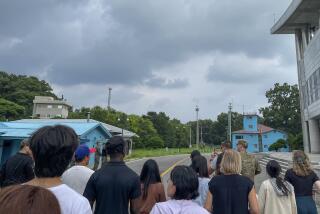U.S. Won’t Apologize for No Gun Ri, Officials Say
- Share via
WASHINGTON — The Clinton administration will try to settle the controversy over the U.S. Army’s killing of civilians in the Korean War by offering South Korea a statement of regret rather than an apology, and a scholarship fund rather than compensation to the families of victims, officials said Thursday.
U.S. officials, who have been investigating the 1950 killings near the village of No Gun Ri for more than a year, say they believe this approach will enable them to satisfy the sensitivities of a close ally without angering U.S. veterans or setting a precedent that might invite a flood of compensation claims stemming from other wars.
The administration is still working out the details. But officials predict that the government will agree to offer the scholarship fund and perhaps also put up U.S. money to build a memorial at the isolated hamlet. U.S. and South Korean officials discussed the issue in Washington this week and are expected to announce their separate conclusions early next month.
The U.S. government’s tentative approach isn’t likely to satisfy all South Koreans, some of whom have sued for compensation. A group of claimants and its lawyer held a news conference in Washington on Tuesday and condemned the investigative reports as a “whitewash.”
And Republican aides in Congress predicted that some lawmakers would object to the scholarship package as a thinly veiled form of compensation.
The No Gun Ri incident came to light in the fall of 1999, when an Associated Press account quoted U.S. veterans describing how they had sprayed bullets at Korean civilians, who they feared included North Korean soldiers. The shootings took place in July 1950, in the opening days of the war, as the inexperienced U.S. troops were retreating before a North Korean onslaught.
After interviewing U.S. and Korean survivors, American investigators concluded that panicked U.S. troops shot Korean civilians who were crowded under a railroad bridge.
But investigators were unable to establish that the troops were firing in response to orders from their superiors, officials said. And they were unable to ascertain how many Koreans died, although they said evidence suggested that the death toll of 300 claimed by some South Koreans was high.
Army Secretary Louis Caldera told a group of reporters last week that some of the war’s civilian casualties “were at the hands of American soldiers.” But he said the situation was “very different from the allegation that was made that this was a massacre in the classic sense, that we lined up innocent people and gunned them down.”
The government’s effort to settle the matter comes at a sensitive moment.
Washington is in the midst of talks with South Korea on extending the Status of Forces Agreement that governs the presence of tens of thousands of U.S. soldiers on the peninsula. And the United States is trying to foster the peace talks between the North and South, which are still technically at war.
Kenneth H. Bacon, the chief Pentagon spokesman, declined to discuss the final report but acknowledged that the idea of a scholarship fund is “a possibility, certainly.”
“We’ve done a very thorough study and tried to run every lead to ground,” he said. “I think we’ve got as close to what happened as you can. . . . I think this will be seen as a very thorough, responsible piece of work.”
Bacon said administration officials have not yet discussed the government’s conclusions with officials of the incoming Bush administration.
J. Norbert Reiner, executive director of the Korean War Veterans Assn., said the scholarship fund “does sound like some form of [compensation] payment.” But he said he wanted to reserve judgment on the government’s overall approach until he has reviewed the final report.
John Petersen of the Washington office of the American Legion said it is somewhat difficult to forecast how veterans will react because the No Gun Ri issue hasn’t drawn much response from the rank and file so far.
One congressional aide, who spoke on condition of anonymity, said he worries that creating a scholarship fund could prompt other countries to demand reparations, beginning with the Vietnamese.
The No Gun Ri proposal could add momentum to a movement already underway to have governments pay more for wartime events, the aide said. Congressional aides often insist on anonymity, preferring that their bosses speak for the record.
“Are we going to be getting claims for Dresden?” asked the aide, referring to the Allied bombing that killed an estimated 135,000 people in the eastern German city during World War II.
More to Read
Sign up for Essential California
The most important California stories and recommendations in your inbox every morning.
You may occasionally receive promotional content from the Los Angeles Times.














